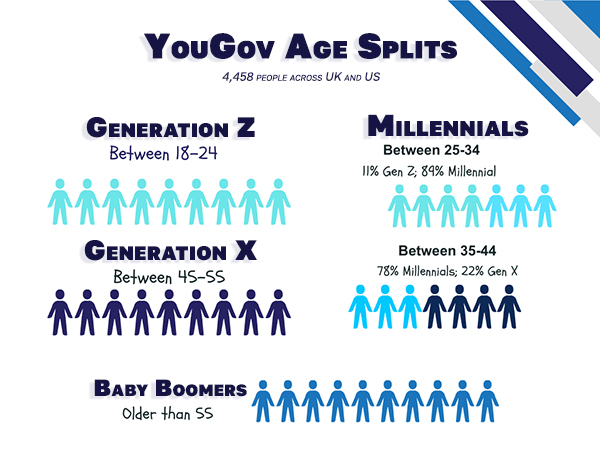
Little wins: the benefits of goal setting
For 70 years, Guinness World Records has inspired and encouraged people to set goals.
That's why we interviewed over 4,000 people on both sides of the pond (including 2,090 adults in the UK and 2,458 in the US) to answer some questions about goal setting.
Methodology and Age Groups
We have asked 4,458 people across the United Kingdom and the United States about their goal-setting habits.
That included:
- Generation Z
- Millennials, including both age splits:
- Younger Millennials (between 25 and 34) and older Millennials (between 35 and 44)
- Generation X and Baby Boomers
The figures have been given an even weighting for each country to produce an average value.

Even the tiniest goal has the potential to grow into an extraordinary journey — it might even lead to a world record!
However, since the first step is often the toughest to take, research from Guinness World Records reveals that some age groups are more hesitant than others when it comes to pursuing their aspirations.
The data shows that commitment levels tend to decrease with age, reflecting the shifting ambitions and priorities across different generations.
In simple terms, the younger you are, the more likely you are to define and commit to your life goals early on.
GEN-Z: GOAL-SETTING PROS
According to the data, individuals in the Generation Z (also called "Gen-Zers," meaning those born between 1997 and 2012) show more ambition than the older generations.
Compared to Millennials and Boomers, Gen-Zers across the board have developed a habit of establishing personal and professional targets for themselves.
To the question "How often do you set goals for yourself?" over one-third of the respondents admitted that they do so regularly or often.
The research also found that Gen Z believe that goal setting is linked to success, either in their personal life or workplace, with a whopping 39% of respondents declaring that they "strongly agreed" with this option when asked.
That surpassed, although by a small margin, the 33% of Millennials who gave the same response.
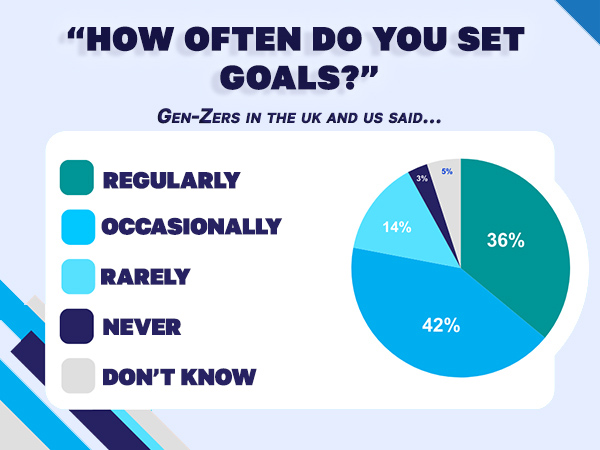
However, the lack of clarity when taking on a new skill can demotivate Gen-Zers more often than other generations.
27% of the respondents between 18 and 24 years of age listed "not knowing where to start" as a reason that prevents them from pursuing a certain goal, compared to the 20% of Millennials and 8% of the respondents over 55.
Even though most Gen-Zers strongly believe in the value of goal setting - with only 8% of young adults stating that they don't believe in the benefits of setting goals, compared to the much-higher 18% individuated in people over 55 - the lack of motivation (41%) is a significant issue when it comes to pursuing their objectives.
Other reasons are the lack of time (26%) and lack of confidence (24%).
MILLENNIALS: FEAR OF UNCERTAINTY
Millennials (born between 1981 and 1996) lag behind compared to their youngest peers.
More specifically, less than 30% establish clear objectives for themselves regularly and tend to do so only a few times a year.
Although half of the Millennials interviewed believe goal-setting improves emotional well-being, they are most likely to be deterred from establishing objectives due to a lack of self-confidence or because they don't have guidance.
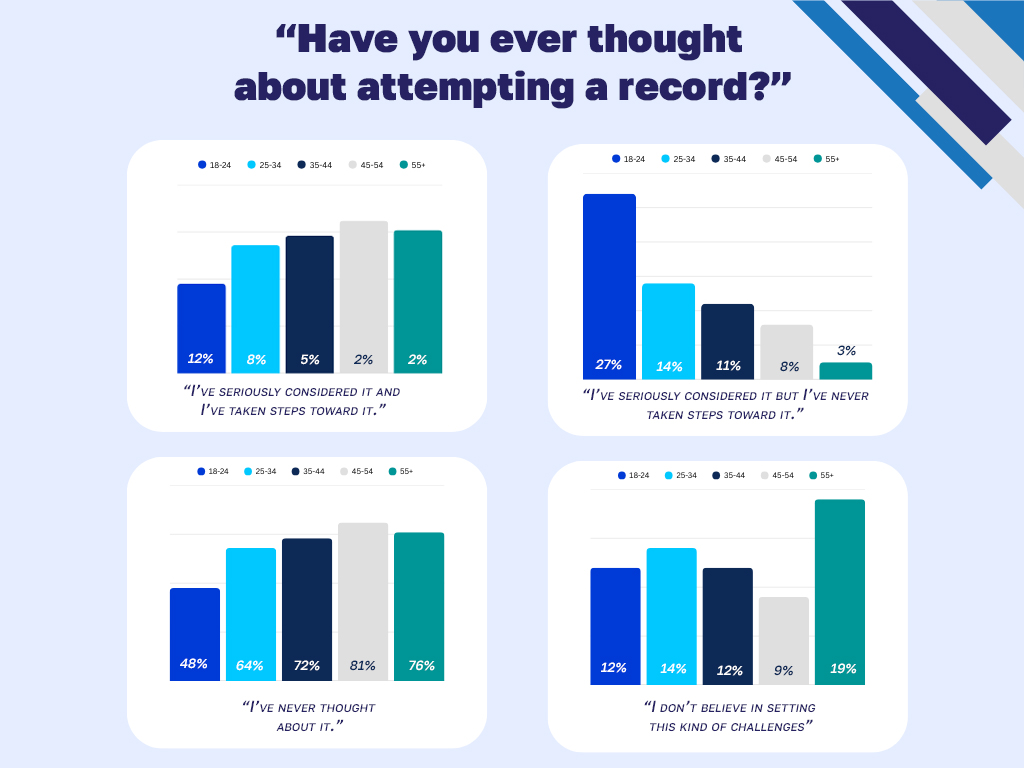
Gen-Zers are more likely to consider attempting a record (and taking steps toward it) than older generations
Setting clear goals is important for their professional and personal lives, Millennials tend to agree.
Most Millennials focus their goal-setting aspirations on achieving personal growth (59%, comparable to the 63% of Gen-Z and 53% of Gen X), but they also hope to create a sense of purpose and meaningful connections with others.
The results also indicate that younger Millennials (25-34 years) see goal-setting as a tool to improve their mental well-being and achieve success, awards, and promotions.
However, such ambitions seldom take the shape of record applications: only 6.5% of Millennials considered attempting a world record, compared to 12% of Gen-Zers.
Moreover, 45% of Millennials between 35 and 44 said they “lacked the motivation to set goals”.
Baby Boomers, instead...
Although Baby Boomers still set goals for themselves a few times a year, the research highlighted that older generations embrace challenges less often than Gen Zers and Millennials - with one in 10 saying they "never define their ambitions".
However, half agreed that setting clear goals is crucial for personal growth and professional success.
Our enthusiasm for setting goals decreases as we grow older, according to the research.
However, even if only 16% of Baby Boomers in the research stated they set monthly goals and overall see less value in goal setting compared to the younger generations, more than a third (37%) declared that they still like to set some kind of target for themselves at least a few times per year.
Although Baby Boomers (37%) see goal-setting as a way of "adding a sense of meaning and purpose to their daily routines", they also express remarkably less interest in designating clear goals as a "way to improve their emotional and mental well-being".
When compared to the other age groups:
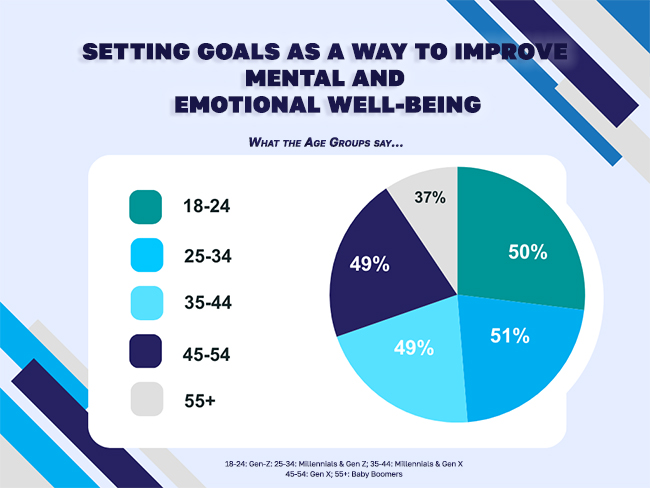
Goal Setting: men vs women
Aside from age, the research highlighted a difference in responses from men and women.
Women
Overall, the research showed that women tend to set more goals for themselves compared to
men:
29% (UK) set themselves regular goals
27% (US) set themselves regular goals
With 11% of female respondents in the UK and 6% in the US having considered breaking or setting a world record, the numbers are promising.
With this potential, the results will surely rise in the near future.
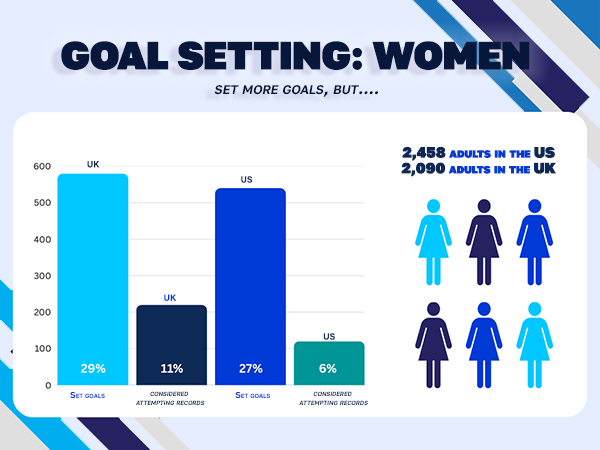
Men
Conversely, male responders in the UK and US tend to set fewer goals for themselves compared to women, although by just a small margin:
28% (UK) set themselves regular goals
26% (US) set themselves regular goals
However, male respondents have considered attempting or setting a record more often than their female counterparts:
17% (UK) considered breaking a world record
9% (US) considered breaking a world record
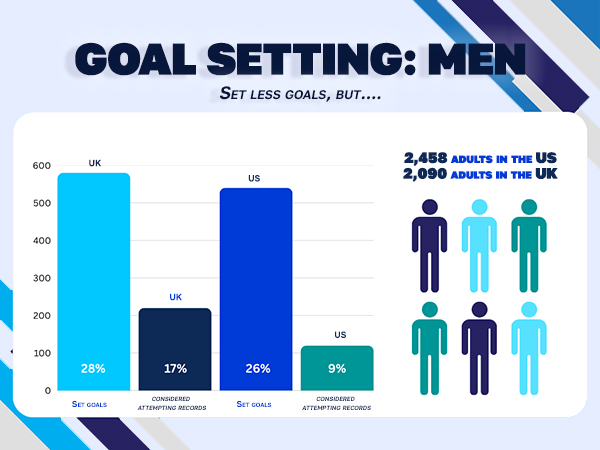
The research showed that, with over 4,000 people surveyed across both sides of the pond, the majority sought personal growth in setting goals.
Emotional well-being was the second-highest motivation: this reason for setting challenges was particularly popular among female respondents, with 48% of women and 43% of men listing mental health as a benefit of goal-setting.
Contrarily, men tend to set goals to achieve measurable success, like promotions or awards (as answered by 38% of men, compared to 30% of women).
Male respondents also welcome challenges to build or cement their relationship with others (22% for men, 17% for women), although respondents of both genders equally agree that the lack of proper guidance can get in the way of their endeavours.
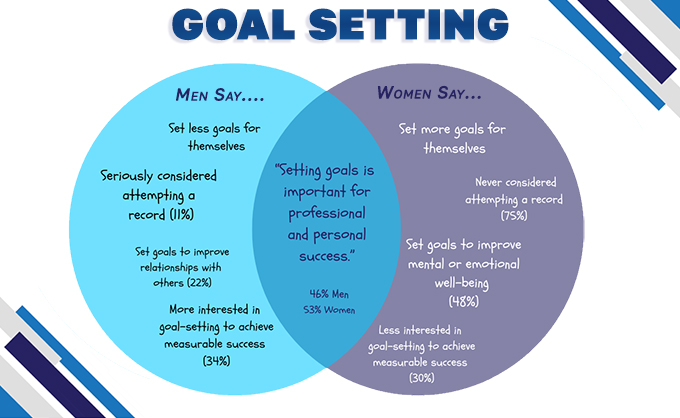
In general, women showed a greater tendency to let fear of failure stop them from taking on new challenges (19%, compared to the 15% of men), while men refrain from setting goals because they don't see any benefit or value in establishing specific objectives in their everyday lives.
That's true for 17% of men in the research, compared to the 11% of women.
Among the reasons that prevent us from setting specific goals:
- Lack of time (22% men, 20% women)
- Lack of motivation (31% men, 34% women) and confidence (19% and 20%)
- Uncertainty about what I want in life (21% men, 23% women)
However, both female and male respondents across the pond agree that setting goals is a way of creating purpose.
Other results
In the US, the research also revealed that...
- Respondents in the Midwest were the least likely to set goals for themselves
- Respondents from the Northeast of the US were most likely to set goals
Lastly, in the United Kingdom, the research indicated that different social grades have different approaches to goal-setting.
The ABC1 audience (meaning a consumer from one of the three higher social and economic groups) is more likely to set objectives than respondents in the C2DE socio-economic group.
The research also showed that respondents from London set goals more often than other regions: 28% set goals more than a few times every month. Conversely, the majority of respondents from Wales (37%) reported they do so less than once a year. In general, Londoners are more likely to agree that "setting goals is important for personal and professional success," racking up the highest net agreement (76%).
Overall, more than in other regions, respondents from Northern Ireland rely on goal-setting to achieve "a sense of purpose or direction" (45%).

Benefits of Setting Goals
Not every challenge needs to be a world record, and that's okay.
We love that people want to watch and read about record breaking. But nothing beats taking part.
Setting clear goals and challenging our self-defined limits can change lives: it can foster personal growth, connect like-minded individuals and bring emotional and physical wellbeing.
We all must start somewhere.
However, getting to the start line can be daunting.
Guinness World Records has partnered with inspirational talents and creators across the UK and the US to share the benefits of new challenges and, especially, the importance of micro-goals.
The record-smashing superstars who talked about their goal-setting journey include:
- Savannah Sachdev, the impressive runner who had a streak of running every day for 1,000 days
- Joshua Iyalla, martial arts superstar and three-time Guinness World Records title holder
- California's most sought-after basketball shooting coach, Chris ‘Lethal Shooter’ Matthews
- Barrington Scott, the record-setting scuba instructor who became the fastest person to scuba dive in all seven continents
"Getting involved is the first step to success, no matter what you want to achieve," explains Chris, renowned as one of the most famous NBA coaches in the world.
"This campaign is about showing how the first micro goal, your first little win, can open the door to much bigger things, while also providing an incomparable wellbeing boost."
"Everyone has their first play," adds Chris, looking back at a time before he picked up a basketball. "So whether it’s your first jog in years or learning a new skill, a little win can mean so much."
"Everyone has to start somewhere," agrees record-setting SCUBA diver Barrington Scott.
It’s not just about breaking records; it’s about pushing your boundaries and discovering what you’re truly capable of.
- Barrington Scott
Born in New York, Barrington is passionate about encouraging more people to step out of their comfort zones and continues to use his platforms and accomplishments to promote representation in aquatics.
"As someone who has had the privilege of attempting and achieving world records, I know the transformative power of setting clear objectives," he says.
"The journey towards any goal is filled with learning experiences that enrich our lives," the record-setting SCUBA instructor continues.
"Until you begin, you never know where that place will be. Whether it's aiming for a world record or simply improving your daily routine, every step forward builds confidence and resilience."
Let these record-breaking voices inspire your next challenge.
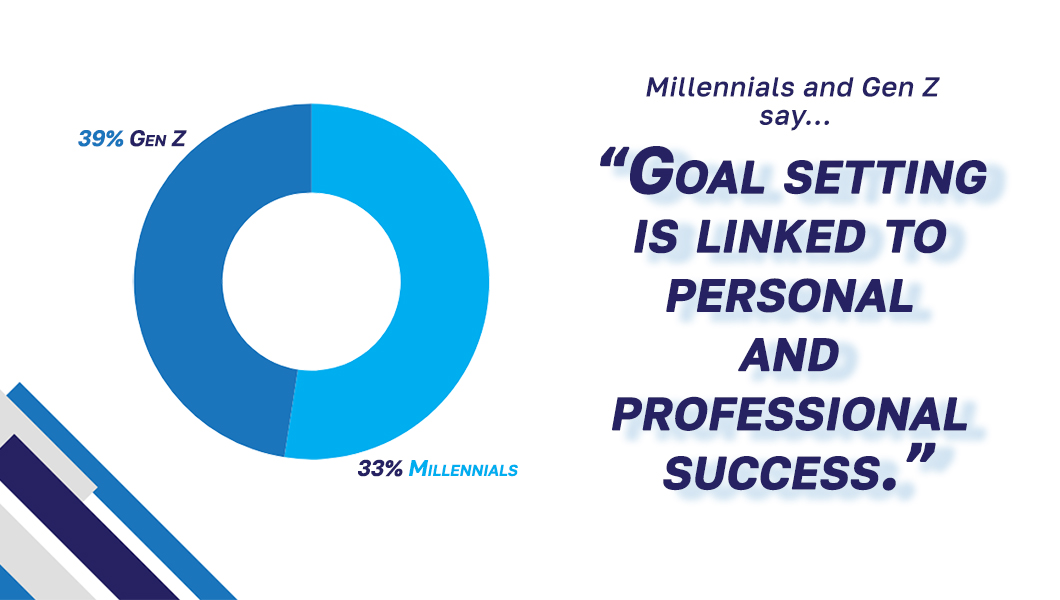

Get Inspired
Discover the Guinness World Records book, your ultimate window to all things record-breaking.
Who knows? You might find your next goal while you flick through the pages of the latest edition of the best seller from the authority on record breaking.



